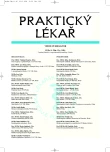-
Medical journals
- Career
Biochemical molecular mechanisms of heart failure
Authors: J. Masopust
Authors‘ workplace: Univerzita Karlova v Praze, 2. lékařská fakulta, Ústav klinické biochemie a patobiochemie Přednosta: doc. MUDr. Richard
Published in: Prakt. Lék. 2006; 86(11): 631-635
Category: Various Specialization
Overview
In the articel, the author presents recent findings in the field of molecular genetics concerning the regulation of foetal development of the heart and its function after birth and in adulthood. In particular, reference is made to the importance of molecular regulation of calcium channel function, the beta-adrenergic system and natriuretic factors in the development of pathological hypertrophy of heart. The role of mutations in the genes for contractile and structural proteins in the pathogenesis of hypertrophic and dilated cardiomyopathy is described, and the association of gene alterations and cardiac arrhythmias is discussed.
Key words:
molecular genetics, heart development, cardiac hypertrophy, heart failure, cardiac arrhythmias
Labels
General practitioner for children and adolescents General practitioner for adults
Article was published inGeneral Practitioner

2006 Issue 11-
All articles in this issue
- Indications of allogeneic and autologous haematopoietic cells transplantation – Recommendations of the Czech Society of Haematology and Czech Society of Oncology of the J. E. Purkyně Czech Medical Association.
- Erectile dysfunction and its relationship to coronary heart disease
- Survey among general practitioners under 35 years of age
- Can Helicobacter pylori be one of the etiological factors of oropharyngeal carcinogenesis?
- Biochemical molecular mechanisms of heart failure
- New approaches to heart valve diseases in experimental and clinical cardiology
- Anaemia in chronic heart failure
- Treatment and prevention of alcohol related problems, general practicioner and evidence based medicine
- Molecular diagnostics of prevalent inherited gastrointestinal diseases: II. Colorectal cancer and diseases of the pancreas
- Valganciclovir in the pre-emptive treatment of cytomegalovirus infections following allogeneic stem cell transplantation.
- Experience in the treatment of torpid condylomata acuminata by 5% imiquimod cream
- General Practitioner
- Journal archive
- Current issue
- Online only
- About the journal
Most read in this issue- Experience in the treatment of torpid condylomata acuminata by 5% imiquimod cream
- Anaemia in chronic heart failure
- Indications of allogeneic and autologous haematopoietic cells transplantation – Recommendations of the Czech Society of Haematology and Czech Society of Oncology of the J. E. Purkyně Czech Medical Association.
- Valganciclovir in the pre-emptive treatment of cytomegalovirus infections following allogeneic stem cell transplantation.
Login#ADS_BOTTOM_SCRIPTS#Forgotten passwordEnter the email address that you registered with. We will send you instructions on how to set a new password.
- Career

